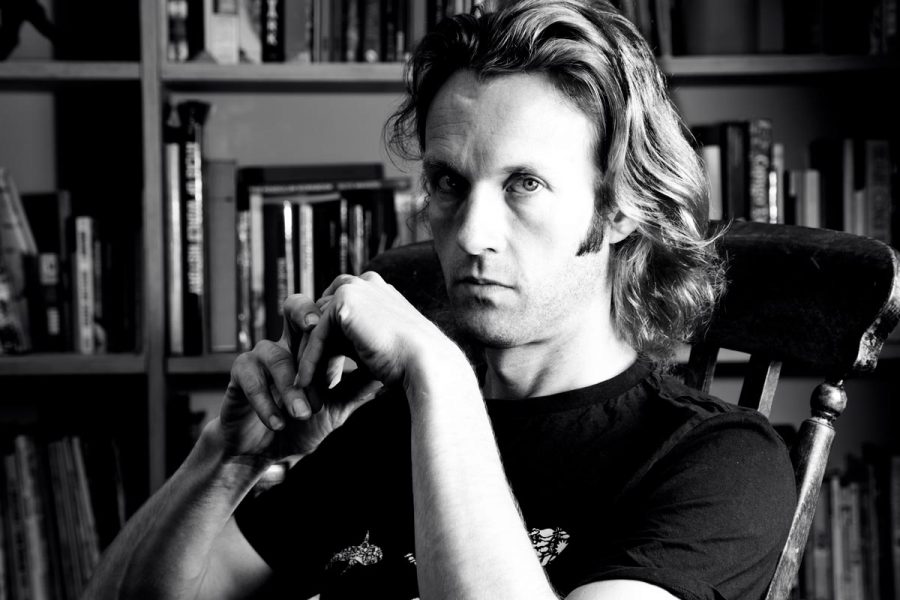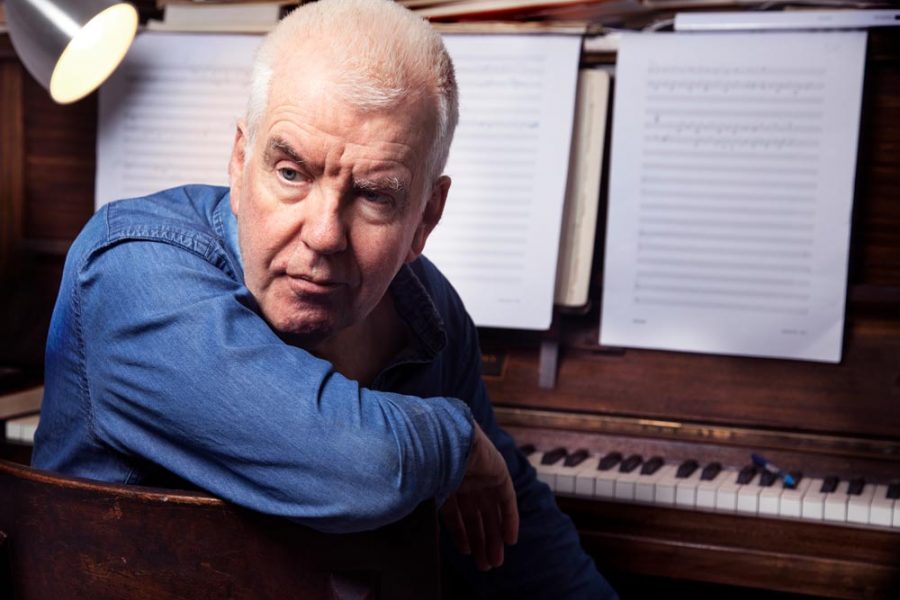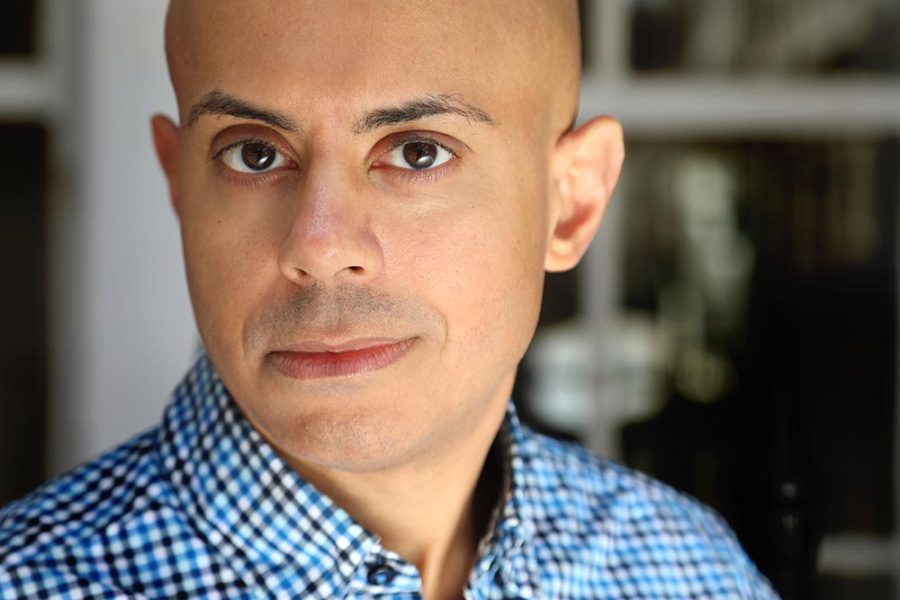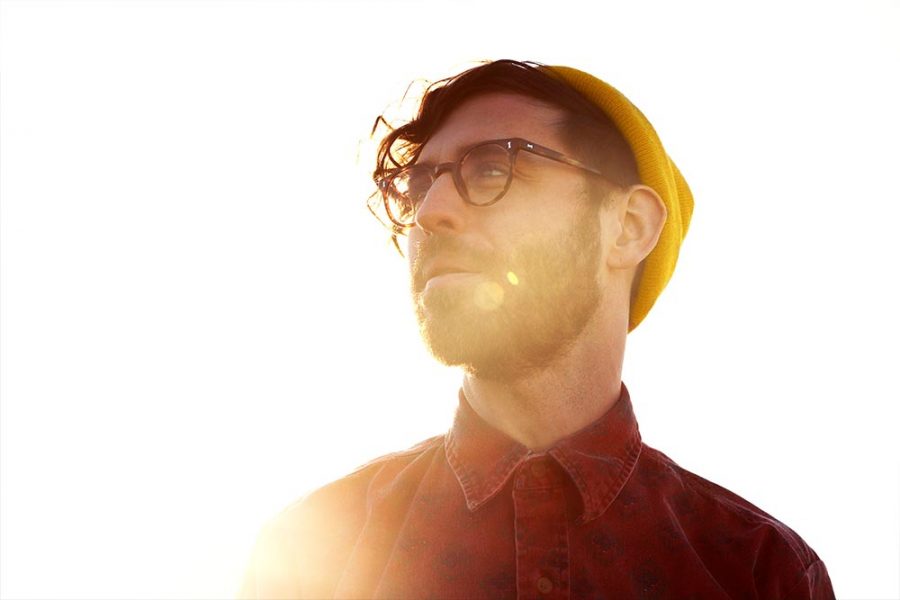20 Operas and Counting: Julian Grant

September 2018
Interview and photos by
Frances Marshall
Julian Grant is an English-born, US resident, composer, writer, educator, music journalist and broadcaster. He is particularly noted for his operas (20 to date), of all shapes and sizes – which have been performed by English National Opera, The Royal Opera, Almeida Opera, Mecklenburgh Opera, Tête à Tête and more.
He has won the National Opera Association of America’s New Opera prize and been nominated for an Olivier Award. His most recent opera, The Nefarious, Immoral yet Highly Profitable Enterprise of Mr Burke and Mr Hare, premiered by Boston Lyric Opera, was nominated for a 2018 International Opera Award.
Julian’s music has been described as ‘full of engaging and humorous ideas. Easy to listen to but yet rewarding’ (Opera magazine). We caught up with him to chat about his music, his move to America, his collaboration with Mark Campbell and the different cultural influences on his work.
What was the first piece you ever composed?
A setting of The Owl and the Pussy-Cat, when I was about eight. Then I wrote a sequel in the form of a piano suite, including a storm, capture by fierce pirates, and finally the owl and pussy-cat got divorced on grounds of incompatibility. My Auntie Betty helped me write it down. I found it in a trunk about fifteen years ago, and did an arrangement for the St. Paul’s Girls’ School junior choir, where I had been musical director (2002–7).
Tell us about your journey to becoming a professional composer.
I still feel I’m embarking on it. I had an inspirational teacher at University, Derek Bourgeois, and a formative experience over two winters at the Banff School of Fine Arts, where there was a music theatre (as opposed to musical theatre or opera) course – where we were encouraged to experiment and redefine the form. A sung-dance piece I wrote – The Skin Drum – won a US prize and got noticed by the newly formed English National Opera studio, and performed in full at its launch. The late, gorgeous, and much missed Susan Chilcott (before her renown) sang gloriously while cavorting in a silver body stocking. David Pountney took me under his wing and went on to commission early pieces for ENO studio and Almeida Opera.
What was the most important thing you learned from your mentor Derek Bourgeois?
As a very languid, arty schoolboy, I was ushered into his office. I’d written an opera at sixteen – an adolescent hodge-podge with a Wagnerian wizard who threw lightning bolts at people – and played it to him. To my surprise, he wanted to hear all of it; and he was vastly amused. He took me under his wing and had a total no-nonsense approach, including making me go to rehearsals of his pieces to see just how tight rehearsal time was. He instructed me how to be as complex as one wished in the most practically executed terms. Invaluable. He was also the conductor of a brass band in Bristol: they needed a ten-minute filler which would be broadcast – and he asked me to write it. The band were incredibly welcoming to me, a lanky nineteen year old – and kept telling me in the friendliest terms what I would do right next time, assuring me that my next piece for them would be a winner!
To this day, if a student brings me sloppy, inaccessible notation I’m all over them like a bad suit. I’ve always found performers to be incredibly keen and curious to do new music, but they cool off considerably if they sense you haven’t done your homework, and understood their craft.

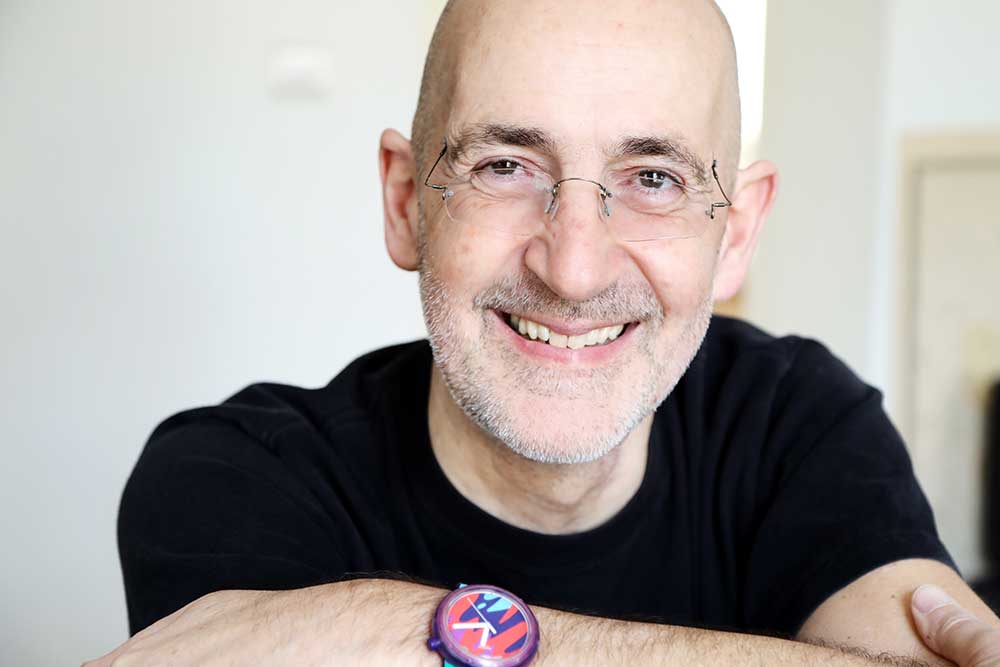


Our ideas and approach could not have been more antithetical! But he got me questioning everything about sound, logic and my approach to writing."

Was there a particular causal moment you had early in your career?
As a fifteen year old schoolboy in Chichester, West Sussex, I met the Dean of the cathedral, the Very Rev. Walter Hussey – who was known as the ‘clerical Diaghilev’. He had commissioned Britten’s early piece ‘A Boy was Born’, Bernstein’s ‘Chichester Psalms’, and had met Richard Strauss! The cathedral drips with artworks he commissioned, from Chagall, John Piper and Graham Sutherland. He commissioned a choral piece from me for the cathedral choir, my fee being a vintage bottle of red wine, which I gave to my mum. That encounter introduced me to a world well beyond what I would have imagined for myself.
A little later, in Banff, in my mid-twenties, I had some sessions with Morton Feldman, in the very last year of his life. I still think about those encounters today. Our ideas and approach could not have been more antithetical! But he got me questioning everything about sound, logic and my approach to writing.
Do you find that the push to get an opera heard is so enormous that the composition is such a small part of the project?
It depends. I’ve never begun an opera on spec, I’ve always been commissioned. My most recent, The Nefarious, Immoral but Highly Profitable Enterprise of Mr. Burke & Mr. Hare had a very tortuous route from commission by Music Theatre Group (Brooklyn) to its premiere by Boston Lyric Opera. But we got there! I think I’m very practical about these matters, though promotion and hustling – mighty alien for me – are not my strength. Many commissions come with complex practical requirements, which I sort of relish, and I find bespoke tailoring of the product very absorbing and stimulating. My Royal Opera piece Hot House (2012) is a case in point: a commission for the Cultural Olympiad, the subject concerned the opera house itself, to be performed by professionals from the opera and ballet companies along with a children’s chorus and a corps de ballet. Not much room to manoeuvre you might think, but Stephen Plaice, Gareth Malone and myself had a high old time slotting all the elements into place – even transforming a major singing role into a dancer at a late stage. Our dancer even demanded a brief solo that was not there, so I had 24 hours to deliver the goods. I felt I had become Rossini!
I find the music will present itself to me if – and that’s a big ‘if’ – all the elements are in place – and that includes a libretto that works, a fulfilling collaboration and a production that is well lined up. Finding a second or third production is often much harder, because the reward of creating the piece is behind you and after the gargantuan labour of writing, it really is time to move on to pastures new.
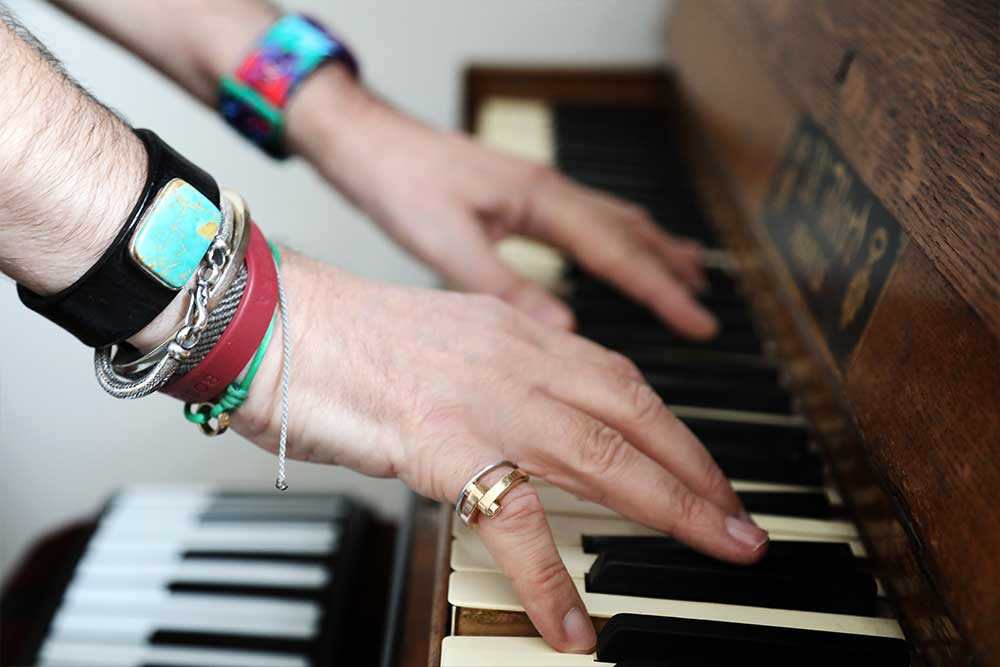


You’ve lived in so many different countries, how did you come to settle in America?
I have been with a wonderful partner, now husband, for 31 years, who is an American. He has a cultural and intellectual grasp second to none and he keeps me on my toes. He had lived out of the USA for almost 30 years, and was a China scholar, teacher and then an international banker, opening the first branch of a US bank in Beijing not long after the Cultural Revolution. We met in London, he got posted to Hong Kong, so I followed, and we adopted two daughters from China, a most unexpected development in my life, and the most rewarding of all. After stints in Japan, London again and Beijing, he wanted to come home. The timing made sense: our girls were bound for high school and middle school, so we settled in the US in 2010. I just became a US citizen in 2017.
Do you feel like you had to rebuild your career every time you moved? How do you introduce yourself in a new city?
Yes, I believe I have had to do this each time. In Hong Kong I got a job as a radio broadcaster, and did some conducting but had my creative life centered back in the UK and Europe. In Beijing I got involved with a new music group which was fascinating, affording me the opportunity to rub elbows with a fusion of Asian and Western composers and performers. When I moved to America, I joined Opera America, a terrific opportunity in terms of reinventing myself within a welcoming network. But America itself, because of its vastness, is difficult to grapple with as a newbie.
You work regularly with the Princeton Symphony Orchestra. How did this relationship begin?
I met the Director of the orchestra at a introductory social at one of our girls’ high schools. She asked me to be on the board of the orchestra. It was a crash course in the way that the arts have to be funded and the way it works in America, with minimal government subsidy and funds privately raised.
Princeton is a small town and in close proximity to prominent orchestras in Philadelphia and New York; yet it has a full professional orchestra. It’s not a student organisation and has nothing to do with the university. Rossen Milanov is the inspirational conductor at present and players come expressly to work with him. The orchestra raises a lot of money to go into the neighbouring schools, and I have even narrated a couple of children’s concerts. Rossen became curious about my music, and has performed a couple of pieces. It’s lovely to have a long-term relationship with an orchestra instead of the usual composer experience of a ‘one-night-stand’.
Your recent opera involved your collaboration with librettist Mark Campbell. Talk us through how you met and your process.
I had been approached by a producer to write an opera based on the Dylan Thomas film script The Doctor and the Devils. Mark and I were a blind date. Having been out of the loop in Asia, I didn’t realise he was everywhere – a librettist to one and all! We clicked immediately, sharing kindred irreverence and humour. Though we both loved the storyline, we were less enamoured of the Dylan Thomas script. It had been written very late in his life and seemed less than finished. When the estate demanded that we stick to the script verbatim, I said ‘forget it – it’s a true story – let’s go back to the source’, which we did. Mark likes to write a complete draft first to get into the spirit of the piece, and we negotiated back and forth, cutting a character here and making the murder victims the true focus of our shared endeavour. We both love to talk of structure, and he’s very musical – unlike some writers I’ve worked with – so he knows when not to write words and what music can express without them. Writing a libretto is not about being a wordsmith, it’s about providing a framework for a theatrical event that is articulated through many elements – light, design, sound, music. There’s a craft to writing an opera – and we had endless conversations about the hard and fast rules to be followed.
What’s the secret to those relationships working so well?
Leave your ego in the wings! Being the creator, people constantly ask me what I want in a rehearsal setting. Having been stuck at a desk for an eternity writing a piece, I know that I want someone to take it from that desk and its paper restraints and breathe life into it. I just love it when something emerges in a way I couldn’t possibly have imagined. I love tailoring things for singers and have no problems adjusting or rewriting in rehearsals. It can take just one viewing of a scene to realise there’s a crashingly obvious problem that did not emerge on the page. We were very lucky with Burke and Hare because we had several workshops; and David Schweizer, our director, was very interventionist – and rightly so – so we were constantly reshaping, rewriting some scenes three or four times.
You’ve lived in many different cultures. Looking back, can you see the environmental influence in your composition style.
Absolutely. I imbibed so many cultures even in my childhood just by listening to differing musics; but this is not the same as living far and wide, absorbing things from the ground up. In Hong Kong, my boss at the university there, Bell Yung, is a world renowned expert on many varieties of Chinese Opera and dragged me to performances, giving me a crash course in a totally different concept of theatre and music. I travelled extensively in Central Asia, Mongolia, and the Muslim areas of western China, where I purchased instruments and learned how to play them. When in Beijing my daughters bought me a Yangqin – a consolation prize for abandoning language studies and sparing me further ridicule from my Chinese speaking family. A Yangqin (Butterfly Harp) is a large dulcimer with a confusing array of strings. It was my good fortune to find a fabulous local teacher, with flame red hair and was also a rock drummer. At one point I had to stop for a month owing to a repetitive strain injury. I wasn’t nearly as strong as she was! So I surprised her by writing a piece for the instrument, which later became the basis of a piano piece Wu Dai Tong Tang [Five generations, one house] which was just performed in a string transcription by the Manitoba Chamber Orchestra.
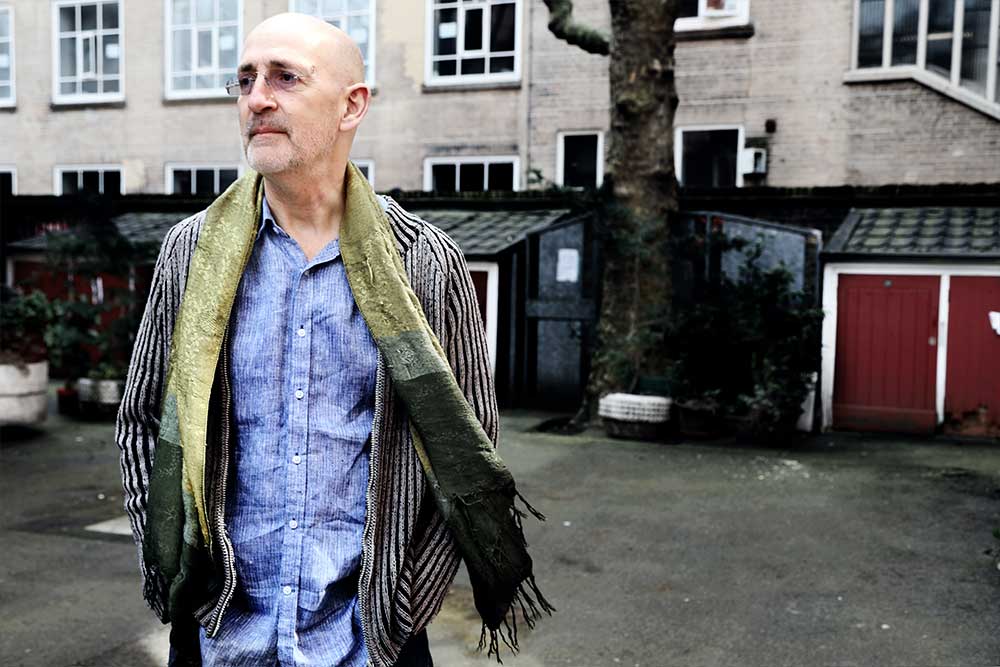

My favourite writing spot is Shelter Island, New York, as I can wander on the sands for hours, but I can, in fact, write almost anywhere."

Do you become reclusive when you write, or do you draw inspiration from those around you?
I like being reclusive. I also enjoy big events, but I’m happy spending a lot of time by myself, and if I’m not writing I can do both. If the writing is going well it can be like an altered state and it can take a while to come back to planet Earth, but if you have two little kids you can’t be reclusive. I would come to the dinner table like a space cadet and then everyone would laugh at me. That would bring me back to reality pretty fast. You can’t be precious about it. My favourite writing spot is Shelter Island, New York, as I can wander on the sands for hours, but I can, in fact, write almost anywhere. And now that the girls are in college, I can keep stupid hours and pretend I’m still a student.
When you’re composing do you prefer to write by hand or through a software?
I make detailed sketches by hand and then I move to software. I generally use Sibelius, which is wonderfully user friendly but it is bar based which is a limitation, and you can spend hours trying to trick it. I’m all about singing to myself and backing that up with pencil and paper. I don’t work at the piano at first, but I’ll use it when my thoughts move too fast so my fingers will slow me down. I’m not a pianist, though I love doodling at it. Actually, I find it limiting when writing for forces other than a keyboard.
What’s next for you?
Having just written a large opera I am relishing writing some much smaller, humbler pieces, where I can chisel away happily without the demands of filling a large canvas. I’m currently writing a cantata for an early music group, the Boston based ensemble Sarasa. It’s a new world for me (how do you write for theorbo?!) so I need to work with the players very closely. Its a collaboration with my long-time friend and legendary director Rhoda Levine who wrote some children’s books many years ago, one of which I am setting to music.
To find out more about Julian Grant see: www.juliangrant.net
All images displayed in this article are subject to copyright.
Share this article


